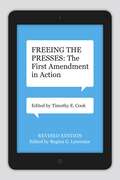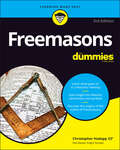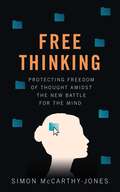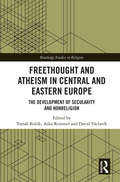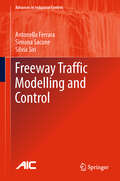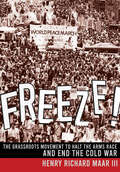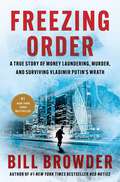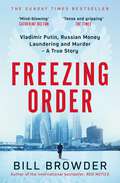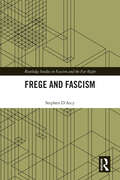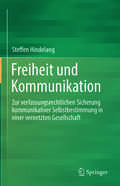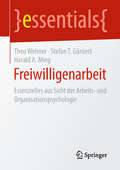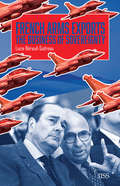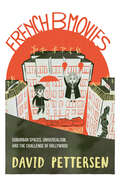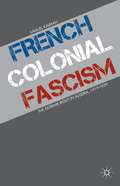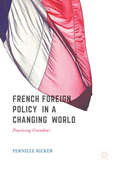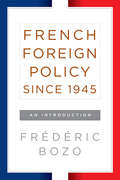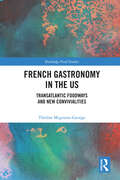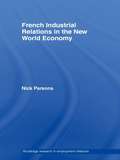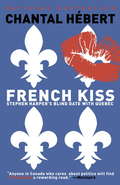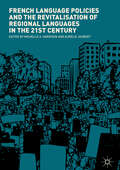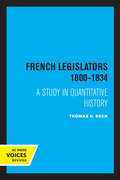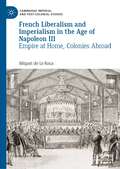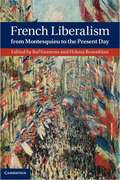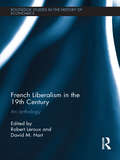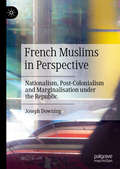- Table View
- List View
Freeing the Presses: The First Amendment in Action (Media & Public Affairs)
by Regina G. Lawrence Timothy E. Cook"A thoughtful, provocative, and timely account of the meaning of a free press in the United States." -- American Journal of Political ScienceMost Americans consider a free press essential to democratic society -- -either as an independent watchdog against governmental abuse of power or as a wide-open marketplace of ideas. But few understand that far--reaching public policies have shaped the news citizens receive. With contributions from leading scholars in the fields of history, legal scholarship, political science, and communications, this revised and updated edition of Freeing the Presses offers an in-depth inquiry into the theory and practice of journalistic freedom. In addition to a new foreword by Regina G. Lawrence and afterword by Laura Stein, Freeing the Presses presents fresh and timely analyses of the complexities of news media and politics.
Freemasons For Dummies
by Christopher HodappUnravel the mysteries of the Masons All the myths and rumors about Masonic organizations probably have you wondering "what do Masons really do?" Questions like this one are a natural by-product of being the oldest and largest "secret society" in the world. This book is an ideal starting place to find answers to your questions about the secret and not-so-secret things about Freemasonry. Now in its third edition, this international best-seller peeks behind the door of your local Masonic lodge and explains the meanings behind the rituals, rites, and symbols of the organization. Along the way the book covers nearly 3,000 years of Masonic history, introduces you to some famous Freemasons you already know from history books, and explains the relationship with related groups like Knights Templar, Scottish Rite, Order of Eastern Star, and the beloved fez-wearing Shriners. Look inside the book to learn: What it takes to become a member of the Freemasons, and what you can expect when you join How Lodges are organized and what really goes on during Masonic ceremonies The basic beliefs and philosophies of Freemasonry, including how Masons contribute to charity, and society in general The origins behind some of the wild myths and conspiracy theories surrounding Freemasonry and how to debunk (most of) them Written by a 33rd degree Scottish Rite Mason and the Public Relations and Marketing Director for the Grand Lodge F&AM of Indiana, Freemasons For Dummies is a must-read guide for anyone interested in this ancient fraternal order, whether you're looking to join or are just curious about some of the more mysterious aspects of Freemasonry.
Freethinking: Protecting Freedom of Thought Amidst the New Battle for the Mind
by Simon McCarthy-JonesScientific advances and new technologies are letting others manipulate our minds more easily than ever before. Now, those tasked with protecting our minds are finally preparing to fight back. As we speak, the United Nations is seeking to pin down a concrete right to free thought and enshrine it in international law alongside life, education and protest. But what is thought? And what makes it free? And how can it best be protected? Freethinking explores what an effective right to freedom of thought would look like, and asks how we might build a culture of free thought, and whether that&’s even what we want. In an uncertain and rapidly evolving world, Freethinking shows that there are solutions to the forces buffeting our minds.
Freethought and Atheism in Central and Eastern Europe: The Development of Secularity and Non-Religion (Routledge Studies in Religion)
This book provides the first comprehensive overview of atheism, secularity and non-religion in Central and Eastern Europe in the twentieth and twenty-first centuries. In contrast to scholarship that has focused on the ‘decline of religion’ and secularization theory, the book builds upon recent trends to focus on the ‘rise of non-religion’ itself. While the label of ‘post-communism’ might suggest a generalized perception of the region, this survey reveals that the precise developments in each country before, after and even during the communist era are surprisingly diverse. A multinational team of contributors provide interdisciplinary case studies covering Estonia, Latvia, Lithuania, Russia, Ukraine, Poland, the Czech Republic, Slovakia, Hungary, Croatia, Romania and Bulgaria. This approach utilises perspectives from social and intellectual history in combination with sociology of religion in order to cover the historical development of secularity and secular thought, complemented with sociological data. The study is framed by methodological and analytical chapters. Offering an important geographical perspective to the study of freethought, atheism, secularity and non-religion, this wide-ranging book will be of significant interest to scholars of twentieth-century social and intellectual history, sociology of religion and non-religion, cultural and religious studies, philosophy and theology.
Freeway Traffic Modelling and Control (Advances in Industrial Control)
by Antonella Ferrara Simona Sacone Silvia SiriThis monograph provides an extended overview of modelling and control approaches for freeway traffic systems, moving from the early methods to the most recent scientific results and field implementations. The concepts of green traffic systems and smart mobility are addressed in the book, since a modern freeway traffic management system should be designed to be sustainable. Future perspectives on freeway traffic control are also analysed and discussed with reference to the most recent technological advancements The most widespread modelling and control techniques for freeway traffic systems are treated with mathematical rigour, but also discussed with reference to their performance assessment and to the expected impact of their practical usage in real traffic systems. In order to make the book accessible to readers of different backgrounds, some fundamental aspects of traffic theory as well as some basic control concepts, useful for better understanding the addressed topics, are provided in the book. This monograph can be used as a textbook for courses on transport engineering, traffic management and control. It is also addressed to experts working in traffic monitoring and control areas and to researchers, technicians and practitioners of both transportation and control engineering. The authors’ systematic vision of traffic modelling and control methods developed over decades makes the book a valuable survey resource for freeway traffic managers, freeway stakeholders and transportation public authorities with professional interests in freeway traffic systems.Advances in Industrial Control reports and encourages the transfer of technology in control engineering. The rapid development of control technology has an impact on all areas of the control discipline. The series offers an opportunity for researchers to present an extended exposition of new work in all aspects of industrial control.
Freeze!: The Grassroots Movement to Halt the Arms Race and End the Cold War
by Henry Richard Maar IIIIn Freeze!, Henry Richard Maar III chronicles the rise of the transformative and transnational Nuclear Weapons Freeze Campaign. Amid an escalating Cold War that pitted the nuclear arsenal of the United States against that of the Soviet Union, the grassroots peace movement emerged sweeping the nation and uniting people around the world.The solution for the arms race that the Campaign proposed: a bilateral freeze on the building, testing, and deployment of nuclear weapons on the part of two superpowers of the US and the USSR. That simple but powerful proposition stirred popular sentiment and provoked protest in the streets and on screen from New York City to London to Berlin. Movie stars and scholars, bishops and reverends, governors and congress members, and, ultimately, US President Reagan and General Secretary Gorbachev took a stand for or against the Freeze proposal. With the Reagan administration so openly discussing the prospect of winnable and survivable nuclear warfare like never before, the Freeze movement forcefully translated decades of private fears into public action. Drawing upon extensive archival research in recently declassified materials, Maar illuminates how the Freeze campaign demonstrated the power and importance of grassroots peace activism in all levels of society. The Freeze movement played an instrumental role in shaping public opinion and American politics, helping establish the conditions that would bring the Cold War to an end.
Freezing Order: A True Story of Money Laundering, Murder, and Surviving Vladimir Putin's Wrath
by Bill BrowderFollowing his explosive New York Times bestseller Red Notice, Bill Browder returns with another gripping thriller chronicling how he became Vladimir Putin’s number one enemy by exposing Putin’s campaign to steal and launder hundreds of billions of dollars and kill anyone who stands in his way. <p><p>When Bill Browder’s young Russian lawyer, Sergei Magnitsky, was beaten to death in a Moscow jail, Browder made it his life’s mission to go after his killers and make sure they faced justice. The first step of that mission was to uncover who was behind the $230 million tax refund scheme that Magnitsky was killed over. <p><p>As Browder and his team tracked the money as it flowed out of Russia through the Baltics and Cyprus and on to Western Europe and the Americas, they were shocked to discover that Vladimir Putin himself was a beneficiary of the crime. <p><p>As law enforcement agencies began freezing the money, Putin retaliated. He and his cronies set up honey traps, hired process servers to chase Browder through cities, murdered more of his Russian allies, and enlisted some of the top lawyers and politicians in America to bring him down. Putin will stop at nothing to protect his money. <p><p>As Freezing Order reveals, it was Browder’s campaign to expose Putin’s corruption that prompted Russia’s intervention in the 2016 US presidential election. At once a financial caper, an international adventure, and a passionate plea for justice, Freezing Order is a stirring morality tale about how one man can take on one of the most ruthless villains in the world—and win. <p> <b>New York Times Bestseller</b>
Freezing Order: A True Story of Russian Money Laundering, State-Sponsored Murder,and Surviving Vladimir Putin's Wrath
by Bill Browder&‘More explosive, compulsive and gasp-inducingly, spine-tinglingly, mouth-dryingly, heart-poundingly thrilling than any fiction I have read for years, but it is all true' Stephen Fry'Mind-blowing...Browder's battle for justice is at times terrifying, at times deeply touching' Catherine Belton&‘A jaw-dropping exposé by Putin&’s anti-corruption nemesis&’ Daily TelegraphFollowing his explosive international bestseller Red Notice, Bill Browder returns with another gripping thriller chronicling how he became Vladimir Putin&’s number one enemy by exposing Putin&’s campaign to steal and launder hundreds of billions of dollars and kill anyone who stands in his way.When Bill Browder&’s young Russian lawyer, Sergei Magnitsky, was beaten to death in a Moscow jail, Browder made it his life&’s mission to go after his killers and make sure they faced justice. The first step of that mission was to uncover who was behind the $230 million tax refund scheme that Magnitsky was killed over. As Browder and his team tracked the money as it flowed out of Russia through the Baltics and Cyprus and on to Western Europe and the Americas, they were shocked to discovered that Vladimir Putin himself was a beneficiary of the crime.As law enforcement agencies began freezing the money, Putin retaliated. He and his cronies set up honey traps, hired process servers to chase Browder through cities, murdered more of his Russian allies, and enlisted some of the top lawyers and politicians in America to bring him down. Putin will stop at nothing to protect his money. As Freezing Order reveals, it was Browder&’s campaign to expose Putin&’s corruption that prompted Russia&’s intervention in the 2016 US presidential election.At once a financial caper, an international adventure and a passionate plea for justice, Freezing Order is a timely and stirring morality tale about how one man can take on one of the most ruthless villains in the world.
Frege and Fascism (Routledge Studies in Fascism and the Far Right)
by Stephen D'ArcyThis book is the first to examine in minutiae the politics of Gottlob Frege (1848–1925), and his connections with various traditions of far-right and fascist thought.Frege was a philosopher of logic, language, and mathematics. But he also believed that one could reconcile the politics of the far right with a firm commitment to reason-guided inquiry and scientific objectivity. The fundamental claim of the text is that Gottlob Frege was, from the early 1890s to the mid-1920s, an anti-democratic, nationalist political thinker and that his political thought eventually took on a fascist character. This book makes no attempt to vilify or demonize Gottlob Frege, nor does it try to rescue him from criticism. It simply seeks to tell the truth about Frege’s descent into fascism: to document it in hitherto unprecedented detail; to situate it in the context of intellectual and political debates in early Weimar-era Germany; and to explain how it could have happened that someone so intelligent and so manifestly devoted to reason and logic could have embraced fascism with such unreserved enthusiasm.Frege and Fascism will be of interest to scholars of analytic philosophy, intellectual history, fascism, and anti-democratic thought.
Freiheit und Kommunikation: Zur verfassungsrechtlichen Sicherung kommunikativer Selbstbestimmung in einer vernetzten Gesellschaft
by Steffen HindelangDieses Buch gibt Antworten darauf, wie in Zeiten von Facebook und Fake News der verfassungsrechtliche Schutz des freien öffentlichen Diskurses gelingen kann. Es untersucht, wie die Verfassung auf einen nicht mehr nur durch Rundfunk und Presse klassischen Zuschnitts, sondern auch durch eine Vielzahl Einzelner organisierten massenmedialen Diskurs reagiert und wie das Verständnis der den Diskurs prägenden verfassungsrechtlichen Bausteine aktualisiert werden kann.Die technischen und wirtschaftlichen Bedingungen massenmedialer Kommunikation haben sich fundamental gewandelt. Das vorherrschende verfassungsdogmatische Schutzkonzept – ein „Ersatzmodell von Freiheit“ – kann diesem Wandel nicht ausreichend Rechnung tragen. Der Einzelne muss heute nicht mehr nur vor, sondern auch in seiner Medienmacht geschützt werden. Ausgehend von kommunikationswissenschaftlichen Erkenntnissen wird ein verfassungsrechtliches Verständnis entwickelt, das den Einzelnen wieder ins Zentrum eines freien massenmedialen Diskurses rückt.
Freiwilligenarbeit: Motivation, Gestaltung Und Organisation (essentials)
by Theo Wehner Stefan T. Güntert Harald A. MiegDie Autoren erörtern in diesem essential die wesentlichen Punkte für das Verständnis und die Organisation von Freiwilligenarbeit. Sie beschäftigen sich mit den folgenden Fragen: Wie können wir freiwillige Arbeit verstehen? Wie wesentlich ist es für diese Art von Arbeit, dass sie unbezahlt bleibt und von sogenannten Laien mit besonderer Motivlage ausgeführt wird? Was folgt daraus für das Zusammenspiel von Freiwilligenarbeit und der professionalisierten, bezahlten Erwerbsarbeit? Diese Fragen werden zunehmend gestellt, denn ohne die unbezahlten Tätigkeiten von Freiwilligen kann kein derzeitiges Gemeinwesen bestehen.
French Arms Exports: The Business of Sovereignty (Adelphi series)
by Lucie Béraud-SudreauFrom De Gaulle onwards, France’s strategic independence has been predicated on self-sufficiency in modern weapons. To achieve and maintain the requisite defence-industrial base, in the context of limited domestic orders, Paris sought to promote the export of its arms. During the Cold War, this underpinned but was also an expression of France’s determination to resist bipolar domination. France offered customers around the world an alternative to reliance on one superpower or the other; and in doing so it generated the revenue to support an extensive domestic arms industry. The end of the Cold War ushered in fundamental changes, however: Western defence spending shrank and the global market was turned upside down. While France’s arms-export policy was less affected by human-rights concerns than other democracies, it was not immune to pressures stemming from the consolidation of Europe’s defence-industrial base and the increased interest of the EU in regulating the arms trade. This Adelphi book considers how France has responded to changing political and market circumstances in the way that it promotes and controls the export of weapons. It examines the rationale for considering a liberal arms-export policy as essential to French independence, and the institutional arrangements that underpinned this. It tracks the dramatic changes in the global arms market since 1990, in terms of demand and market competition, and charts the response of the French government to these changes. The book underlines how the French machinery of government, as a directing force behind the defence industry, has been resistant to the notion of export restraint – even in the case of sales to authoritarian regimes. However, it argues that France now faces a dilemma over whether to continue with a long-successful course, or to moderate its independence through greater collaboration to bolster European integration and better compete globally.
French B Movies: Suburban Spaces, Universalism, and the Challenge of Hollywood (New Directions in National Cinemas)
by David A. PettersenIn the impoverished outskirts of French cities, known as the banlieues, minority communities are turning to American culture, history, and theory to make their own voices, cultures, and histories visible. Filmmakers have followed suit, turning to Hollywood genre conventions to challenge notions of identity, belonging, and marginalization in mainstream French film.French B Movies proposes that French banlieue films, far from being a fringe genre, offer a privileged site from which to understand the current state of the French film industry in an age of globalization. This gritty style appears in popular arthouse films such as Mathieu Kassovitz's La Haine and Bande de filles (Girlhood) along with the major Netflix hit series Lupin. David Pettersen traces how, in these works and others, directors fuse features of banlieue cinema with genre formulas associated with both Hollywood and Black cultural models, as well as how transnational genre hybridizations, such as B movies, have become part of the ecosystem of the French film industry.By combining film analysis, cultural history, critical theory, and industry studies, French B Movies reveals how featuring banlieues is as much about trying to imagine new identities and production models for French cinema as it is about representation.
French Colonial Fascism
by Samuel KalmanAlarmed by a growing Muslim population and a reputedly weak imperial administration, European settlers in Algeria in the early twentieth century increasingly turned to fascism in order to seize power and create an authoritarian regime. This study investigates the extreme-rightist leagues that arose in this context, with particular attention to the rabid xenophobia directed at local Jews and Muslims, who were derisively branded 'indigenes' and cast as anti-colonial and left-wing actors. In their attempts to preserve European hegemony and a subjugated pool of unskilled labor, these groups helped to cement a clear racial hierarchy and definitively shaped Algeria's colonial history. "
French Foreign Policy in a Changing World
by Pernille RiekerThis book investigates how modern French foreign policy is practiced. France finds its traditional power status challenged by internal as well as external developments. Internally, it faces societal challenges related to unemployment, integration, social exclusion, Islamist terrorism and the rise of populism. Externally, its status is challenged by global and regional developments - including the financial crises, competition from emerging states, EU enlargement and a more powerful Germany. While the French recognise that they no longer have great-power economic or military power capacities, the conviction of the universal value of French civilization and culture remains strong. As this book argues, for France to be able to punch above its weight in international politics, it must effectively promote the value of 'French universalism' and culture. This study investigates how this is reflected in modern French foreign policy by examining foreign policy practices towards selected regions/countries and in relation to external and internal security. Written by a senior researcher specializing in French and EU foreign and security policy, this book will be an invaluable resource for practitioners of foreign policy and students of French politics, international relations and European studies.
French Foreign Policy since 1945: An Introduction
by Frédéric BozoWhen Charles de Gaulle declared that "it is because we are no longer a great power that we need a grand policy," he neatly summarized France's predicament on the world scene. In this compact and engaging history, author Frédéric Bozo deftly recounts France's efforts to reconcile its proud history and global ambitions with a realistic appraisal of its capabilities, from the aftermath of World War II to the present. He provides insightful analysis of the nation's triumphs and setbacks through the years of decolonization, Cold War maneuvering, and European unification, as well as the more contemporary challenges posed by an increasingly multipolar and interconnected world.
French Gastronomy in the US: Transatlantic Foodways and New Convivialities (Routledge Food Studies)
by Thérèse Migraine-GeorgeThis book focuses on the (re)invention of French food in the US, probing the intricate transatlantic dynamics underlying notions of cooking and eating French.By looking at French gastronomy as both a symbolic formation and an exclusionary practice closely tied to power, class, and race, this book re-centers histories that have been marginalized in traditional narratives of French gastronomy. Rather than focusing on food itself, this book explores transatlantic foodways and the complex and changing nexus of historical, socioeconomic, cultural, political, and ideological routes and trajectories, both real and imaginary, that have connected France and the US around a range of gastronomical practices and representations. Foregrounding the gastronationalism that subtends the idea of “eating French” in the US, this book also looks at how a diverse group of contemporary chefs is working to deconstruct stereotypical and constrictive representations of French food and to create new cuisines that are, in turn, more inviting, inclusive, hospitable, and convivial as well as more globally sustainable. Exploring the transatlantic relation between France and the US through the lens of food offers a significant point of entry into the ways in which imagined gastronomies reflect imagined communities past, present, and future in an ever-globalizing world.This book will be of great interest to students and scholars from a wide range of interdisciplinary fields of study including food studies, global French and Francophone studies, cultural studies, media studies, Black/African American studies, history, and ethnography.
French Industrial Relations in the New World Economy (Routledge Research in Employment Relations #Vol. 15)
by Nick ParsonsExamining the traditionally predominant role of the state in shaping employment patterns and social policy in France, French Industrial Relations in the New World Economy analyzes the impact of globalization on French industrial relations. Looking at the changing economic context of industrial relations, this important text places particular emphasis on the notion of a shift from a national, Fordist form of employment regulation, to an international, post-Fordist form - examining in detail the impact of this shift on the role of the French state and on the balance of power between employer and trade union organizations. Including chapters on employer organizations, collective bargaining, the role of the state, and workplace representation, French Industrial Relations in the New World Economy explores this fascinating topic in detail and provides a detailed resource for postgraduates studying trade unions, industrial and employee relations, and industrial studies in general.
French Kiss
by Chantal HebertChantal Hébert's first book is both a post-mortem of the Canadian federation that died on January 23, 2006, the night of the last federal election, as well as a brilliant examination of our changing political future, one that involves living with Quebec rather than just wooing it. On that night, award-winning political writer and broadcaster Chantal Hébert stood in a Calgary convention hall with 2,000 Alberta Conservatives, who were raucously cheering the election of ten Tory MPs from Quebec. The Conservatives would not have gotten their man in office without Quebec, and now the future success of the Harper government hinges on turning this one-night stand into a long-term relationship.More than ten years ago, the Quebec-Alberta coalition cobbled together by Brian Mulroney dissolved, leading to the births of the Bloc Québecois and the Reform Party. As a result, Alberta and Quebec took their marbles out of federal play, and Ontario got to run Canada.Have we now come full circle? By the time this book is published, the Liberal Party of Canada may have morphed into the Liberal Party of Ontario (or Toronto). And the Canadian Left will have chosen a camp in preparation for a decisive federal election battle.Provocative and always worth listening to, Chantal Hébert is at her savvy and insightful best in French Kiss. No Canadian can be truly informed on the subject of Canadian politics without the benefit of her non-partisan commentary.From the Hardcover edition.
French Language Policies and the Revitalisation of Regional Languages in the 21st Century
by Michelle A. Harrison Aurélie JoubertThis edited volume presents an analysis of the evolution of French language policies and their impact on French regional languages and their communities. It gathers studies on language revitalisation from several territorial minority languages (Breton, Alsatian, Catalan, Occitan, Basque, Corsican, Francoprovençal, Picard, Reunionese) and evaluates the challenges and opportunities that they face in the 21st century. The chapters tackle different aspects of language endangerment and language planning and adopt varied theoretical and methodological approaches. The first section of the book reconsiders the difficulties in establishing linguistic boundaries and classification for some regional languages. The second section examines the important theme of the new generation of speakers with issues of transmission and identity formation and the changes they can bring to traditional communities. The third section highlights new developments in the context of new technologies and the heightened visibility of regional languages. Finally, the last section presents an overview of the contemporary situation of minority language revitalisation in France and synthesises the key trends identified in this volume: from the educational domain to the European Charter for Minority and Regional languages. This book will appeal to students and scholars of the sociology of language, sociolinguistics, language policy, minority languages and language endangerment.
French Legislators 1800 - 1834: A Study in Quantitative History
by Thomas D. BeckThis title is part of UC Press's Voices Revived program, which commemorates University of California Press’s mission to seek out and cultivate the brightest minds and give them voice, reach, and impact. Drawing on a backlist dating to 1893, Voices Revived makes high-quality, peer-reviewed scholarship accessible once again using print-on-demand technology. This title was originally published in 1974.
French Liberalism and Imperialism in the Age of Napoleon III: Empire at Home, Colonies Abroad (Cambridge Imperial and Post-Colonial Studies)
by Miquel de la RosaThis book explores the interplay between liberalism and imperialism in Second Empire France. By examining the political dimension of imperial expansion and the power of words in shaping public opinion, it sheds light on the ways in which liberal ideas developed in the nineteenth century. In contrast to Britain, French imperialism in the third quarter of the nineteenth century was fostered by a Bonapartist regime that liberals needed to fight in order to build their own political brand. The author argues that the 1860s were not so much a period of ‘liberal empire’ in France as has traditionally been suggested, since liberals were in fact more conveyers of political change rather than supporters of the regime. To demonstrate how French liberals succeeded in configuring an alternative political option, the book explores their attitudes to the expanding colonial empire of Napoleon III in the 1850s and 60s through the analysis of parliamentary debates, the press and published texts. Providing three in-depth case studies on Bonapartist expansion projects in Algeria, Cochinchina and Mexico, the book provides new insights on the foundations of the liberal position on imperialism, and the intellectual outlooks and belief systems that informed these views. Analysing discourses and ideas, as opposed to facts and policies, this book presents a new perspective on the nature of the French Second Empire and illustrates how this shaped a specific liberal political culture in France.
French Liberalism from Montesquieu to the Present Day
by Raf Geenens Helena RosenblattThere is an enduring assumption that the French have never been and will never be liberal. As with all clichés, this contains a grain of truth, but it also overlooks an important school of thought that has been a constant presence in French intellectual and political culture for nearly three centuries: French political liberalism. In this collaborative volume, a distinguished group of philosophers, political theorists and intellectual historians uncover this unjustly neglected tradition. The chapters examine the nature and distinctiveness of French liberalism, providing a comprehensive treatment of major themes including French liberalism's relationship with republicanism, Protestantism, utilitarianism and the human rights tradition. Individual chapters are devoted to Montesquieu, Tocqueville, Aron, Lefort and Gauchet, as well as to some lesser known, yet important thinkers, including several political economists and French-style 'neoliberals'. French Liberalism from Montesquieu to the Present Day is essential reading for all those interested in the history of political thought.
French Liberalism in the 19th Century: An Anthology (Routledge Studies In The History Of Economics #145)
by David M. Hart Robert LerouxPolitical and economic liberalism has generally been considered to be of marginal import in France, but at an intellectual level, it is a different story. An exploration of the history of French economic thought shows how a rich intellectual tradition developed during the nineteenth century, which has been previously neglected in English language studies of French thinking. In this important new collection, Robert Leroux brings together key works, both from widely regarded and lesser known authors, whose thinking constituted the core of a singular intellectual movement. These include such figures as Charles Dunoyer, Joseph Garnier, Gustave de Molinari, Yves Guyot, Alexis de Tocqueville, Benjamin Constant and Frédéric Bastiat. Including several works that have never before been published in English, this anthology begins with a full introduction that provides an overview of liberal thought in the nineteenth century, and each text is preceded by a biographical note on the author, and an explanation of the wider significance of the text. This anthology, by bringing to the fore a number of writers and doctrinal positions, seeks to give a coherence, an overall cast to French liberalism without exaggerating its unity. It will be of interest to economists, political scientists, historians, philosophers and sociologists alike.
French Muslims in Perspective: Nationalism, Post-Colonialism and Marginalisation under the Republic
by Joseph DowningWith the largest Muslim population in Western Europe, France has faced a number of critiques in its attempts to assimilate Muslims into an ostensibly secular (but predominantly Catholic) state and society. This book challenges traditional analyses that emphasise the conflict between Muslims and the French state and broader French society, by exploring the intersection of Muslim faith with other identities, as well as the central roles of Muslims in French civil society, politics and the media. The tensions created by attacks on French soil by Islamic State have contributed to growing acceptance of the Islamophobic discourse of Marine Le Pen and her far-right Front National party, and debates about issues such as headscarves and burkinis have garnered worldwide attention. Downing addresses these issues from a new angle, eschewing the traditional us-and-them narrative and offering a more nuanced account based on people’s actual lived experiences. French Muslims in Perspective will be of interest to students and scholars across sociology, politics, international relations, cultural studies, European Studies and French studies, as well as policy makers and practitioners involved in immigration, education, and media.
